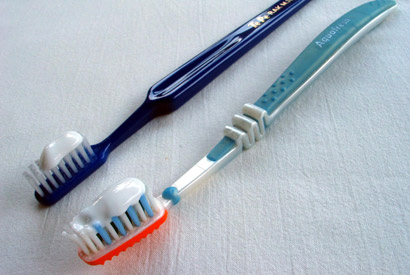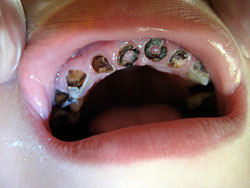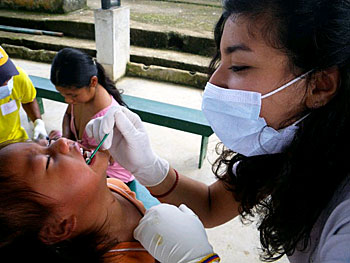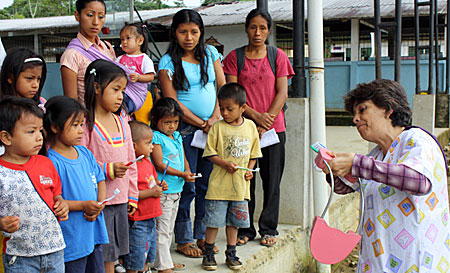Prof takes on a global health crisis, one toothbrush at a time
Ever since Coke and chips replaced local foods in village shops, decayed teeth are a common sight among children in the developing world. But by way of simple oral-health education, Karen Sokal-Gutierrez, professor of public health, has been helping to fight this under-appreciated healthcare problem in El Salvador. Now her students are taking similar healthy-teeth projects to other countries.

June 15, 2012
Twenty years after a Peace Corps stint in Latin America, Karen Sokal-Gutierrez returned to the same kind of villages she’d worked in for two years. What she saw shocked her.
 “Children would come up and hug us — and what I noticed was black teeth,” says Sokal-Gutierrez, a medical doctor and professor in UC Berkeley’s School of Public Health. She went back to her Peace Corps photos, where all the children’s teeth looked beautiful. In the intervening years, one thing had changed: Soda and junk food had replaced fruits and other local staples in village markets.
“Children would come up and hug us — and what I noticed was black teeth,” says Sokal-Gutierrez, a medical doctor and professor in UC Berkeley’s School of Public Health. She went back to her Peace Corps photos, where all the children’s teeth looked beautiful. In the intervening years, one thing had changed: Soda and junk food had replaced fruits and other local staples in village markets.
“The parents were saying, ‘My kids are crying all the time from mouth pain. They can’t eat, they can’t sleep, they can’t play,’ ” she recalls. Decay was setting in as young as age 2, and “by the time they arrive at school at age 6, they’re in constant pain, they’re malnourished. They’re not ready to learn.”
Sokal-Gutierrez is a pediatrician, and she knew a public health emergency when she saw one. She decided to do something about it. With donations of toothbrushes and toothpaste and generous allotments of her own money and time, she founded the Children’s Oral Health and Nutrition Project, starting in El Salvador in 2004.
Every summer, flying in with duffel bags stuffed with basic dental supplies and educational materials, she spends about two weeks examining children’s teeth and engaging local health workers to teach the children and their parents how to take care of their teeth — and why it matters.

UC Berkeley student Gardenia Casillas examines an Ecuadorian child’s teeth.
From the get-go, Berkeley undergrad and grad students have been involved, more than 100 volunteers so far. They’ve had to raise their own funds to cover airfare and other costs to go along with Sokal-Gutierrez. And now, some of those students are helping to lead new iterations of the project in other countries — Ecuador and Nepal since 2010, Vietnam since 2011, Peru in 2012, and possibly India in 2013. Many former student volunteers have gone on to careers in medicine, dentistry and public health.
Gardenia Casillas, a rising senior from Salinas who aspires to advanced degrees in medicine and public health, scraped together $1,600 for last summer’s Ecuador visit and says the experience catalyzed an electrifying perspective change. “Some of the kids had every tooth decayed. They had pus flowing out,” she says. “We always hear about how underdeveloped countries don’t have access to doctors, but when you actually see it, it’s really different.”
It’s a global problem, Sokal-Gutierrez says — but one that’s not widely recognized as a threat to public health. She wants to change that, too, and provides a graphic example of the health implications from an Ecuadorian village: A 5-year-old boy with all 20 baby teeth decayed, who was so pale, skinny and tired he “looked like child dying of AIDS.” He weighed just 27 pounds, about the same as an American 2-year-old. His parents owned the village store, and he had unlimited access to candy.
“I’ve seen it in every developing country I’ve visited or heard from, especially in Latin America and Asia, and it’s coming in Africa,” says Sokal-Gutierrez. “We’ve identified an emerging problem that needs to be dealt with in future. The tragedy, and the opportunity, is that this problem is entirely preventable.”
The first thing Sokal-Gutierrez did to get her project off the ground was to assess the problem. Working with a nonprofit community health organization established in rural El Salvador, ASAPROSAR, she and a student examined a couple of hundred children from 6 months to 6 years old in local villages and interviewed their mothers.
“We found that 85 percent of the children had tooth decay and nearly half had mouth pain,” she says.
She presented the results to the doctor who directs the non-profit by asking: “What would you say if I told you there was a medical condition that affected 85 percent of the children in your villages?” The doctor told her, “I’d say it’s an epidemic. What is it — measles? Polio?” Sokal-Gutierrez revealed her findings, and the doctor was stunned to recognize that they had an epidemic of tooth decay.

Ecuadorian children and mothers watch intently as Dr. Cecilia Paz, a Quito dentist who volunteers with the project, shows them how to brush their teeth.
For six years, Sokal-Gutierrez and volunteer students, doctors and dentists returned to the same villages. They trained all the community health workers in oral health and nutrition, and trained the local dentists to apply fluoride varnish to children’s teeth. They provided free toothbrushes and toothpaste to children and families. They educated everyone they could. And they continued to examine the children and interview the mothers.
At the end of the six-year period, preliminary results showed improvement — the kids were eating less junk food and brushing their teeth more. Tooth decay was reduced from 85 percent to 50 percent of children. Mouth pain was reduced from 47 percent to 22 percent. And malnutrition dropped from 16 percent to 2 percent. The children who fared best were those involved from birth, who formed a cohort ready to start school well-nourished, with healthy mouths, ready to learn.
Based on this pilot project, Sokal-Gutierrez had a model to take to other countries.
The newer projects in Ecuador, Nepal and Vietnam are led by Berkeley students who have now graduated, are going into careers in medicine and public health, and have extended family in those countries or whose parents grew up there.
“It’s been great for these students to have a way to give back,” says Sokal-Gutierrez, who is like a second mom to many of them.
Sokal-Gutierrez earned her MD at UCSF and her master’s in public health at Berkeley. She is an associate clinical professor in the UC Berkeley-UCSF Joint Medical Program, the UCB School of Public Health and Berkeley’s Health Research for Action Center. Her student volunteers include medical students and undergraduates who find the Children’s Oral Health and Nutrition Project through her frequent presentations to biology, public health and other classes, the Undergraduate Research Apprenticeship Program, and through the Biology Scholars Program for students from groups underrepresented in the field who plan to enter health professions.
Most of her volunteers are from ethnic minority backgrounds or are the first in their family to attend college. She explains, “My basic goals for this project are two-fold: To improve children’s health throughout the developing world; and to provide a hands-on public-health experience and mentorship for promising students.” In 2011, Dr. Sokal-Gutierrez was awarded the UC Berkeley Chancellor’s Award for Public Service for her work in global health and mentoring students.
Gardenia Casillas is a good example. Her parents came to California from Mexico as farm workers, later working in the flower nursery that inspired her first name. She is a year from completing an interdisciplinary major that combines public health, social welfare and journalism/literature and aspires to a career as an MD and MPH (master’s in public health), like Sokal-Gutierrez.
She met Sokal-Gutierrez at a student-professor dinner and heard about the project. Two weeks later, she was on a plane to Ecuador.
“Being from parents who are from Mexico, and having traveled to Mexico, I was really sure that other underdeveloped countries need that kind of help,” she says. “I thought, I could do that.”
Helping build a bridge between the resources of a major university and a community in need is dear to her heart, both in the oral health project and in her work-study job doing research and outreach with CHAMACOS, the longterm study of children’s and mothers’ health in Salinas run by Berkeley’s Center for Environmental Research and Children’s Health.
Casillas wanted to go back to Ecuador this summer, but any extra money she had was needed by her family: her younger sister is starting college. She’ll be in Ethiopia instead, taking advantage of a Harvard fellowship in public health.
In addition to student volunteers, the Children’s Oral Health and Nutrition Project also captured the interest of two students in Berkeley’s Graduate School of Journalism. A video co-produced by the two, Carl Nasman and Roberto Daza, now recent graduates, aired on the PBS NewsHour on June 8 and can be viewed on the program’s website.
The Children’s Oral Health and Nutrition Project has relied on donations of dental supplies from a variety of companies and foundations, and small grants educational, medical and service groups. However, lack of significant funding is a perennial problem for the project, and the only thing standing in the way of expanding it to more villages and more countries. A project in India may start next year, led by Indian American students currently involved in the Nepal project. But the project’s reach is still minuscule compared to the need, Sokal-Gutierrez says, despite its low cost, just $5 to $10 per family per year.
“We’re really making a difference in the lives of children,” she says. “My dream is to be able to extend to a much larger number of children.”
More information about the newer projects can be viewed on the Health Research for Action website: Ecuador, Nepal and Vietnam (with link to video).
Dr. Sokal-Gutierrez can be contacted at [email protected]. She adds that tax-deductible donations to the project can be made through the School of Public Health online giving site: https://givetocal.berkeley.edu/search/?s=oral+health